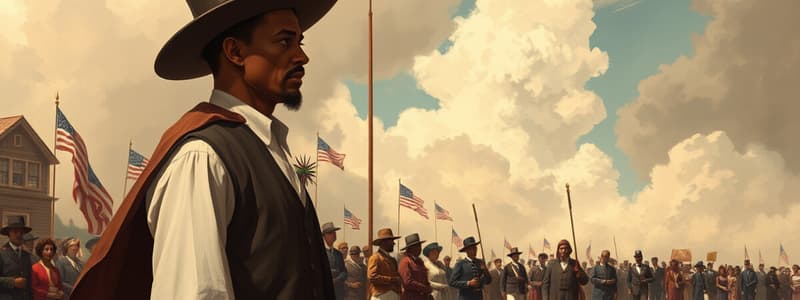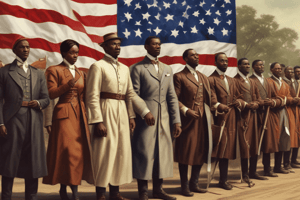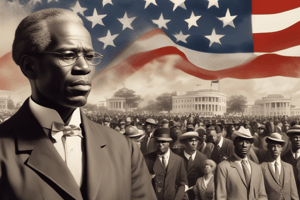Podcast
Questions and Answers
Reconstruction achieved complete economic recovery for the South.
Reconstruction achieved complete economic recovery for the South.
False (B)
The Fourteenth Amendment granted citizenship to all persons born or naturalized in the United States, including former slaves.
The Fourteenth Amendment granted citizenship to all persons born or naturalized in the United States, including former slaves.
True (A)
President Johnson was a strong supporter of the Radical Republican approach to Reconstruction.
President Johnson was a strong supporter of the Radical Republican approach to Reconstruction.
False (B)
The Ku Klux Klan was formed as a reaction against the Reconstruction governments.
The Ku Klux Klan was formed as a reaction against the Reconstruction governments.
The Fifteenth Amendment prohibits denying citizens the right to vote based on race, color, or previous condition of servitude.
The Fifteenth Amendment prohibits denying citizens the right to vote based on race, color, or previous condition of servitude.
Reconstruction ended without any significant changes for African Americans in the South.
Reconstruction ended without any significant changes for African Americans in the South.
Congress took control of Reconstruction due to a lack of faith in President Johnson's policies.
Congress took control of Reconstruction due to a lack of faith in President Johnson's policies.
Rebuilding Southern industry was a key focus during the Reconstruction era.
Rebuilding Southern industry was a key focus during the Reconstruction era.
Flashcards are hidden until you start studying
Study Notes
Reconstruction Overview
- Aimed to address the issues following the Civil War and rebuild the nation.
- The success of Reconstruction remains debated regarding its goals for racial equality and reintegration of Southern states.
Rebuilding the South
- Reconstruction begins with various initiatives to restore the South and integrate it back into the Union.
- African Americans gain freedom through legislative and military efforts, but challenges persist.
- President Johnson's Reconstruction Plan emphasizes leniency towards the South but faces criticism for being too forgiving.
The Fight over Reconstruction
- Pre-war Southern leaders regain power, prompting conflict with Republican Congress members.
- Opposition to President Johnson grows as his policies clash with Republican goals for stronger civil rights protections.
- The Fourteenth Amendment is ratified, granting citizenship and equal protection under the law to all persons born or naturalized in the U.S.
- Congress asserts control over Reconstruction efforts, highlighting tensions between branches of government.
- The Fifteenth Amendment is passed, prohibiting voter discrimination based on race, thus granting African American men the right to vote.
Reconstruction in the South
- Reconstruction governments establish laws and policies to promote civil rights and rebuild infrastructure.
- The rise of the Ku Klux Klan signifies growing violence and resistance against African American rights and Reconstruction policies.
- Reconstruction officially ends with compromises and shifts in political power, leading to segregationist policies.
- Economic efforts focus on rebuilding Southern industry, although many regions remain impoverished.
- Reconstruction's legacy in the North reflects a mixed response to the changes occurring in Southern society and race relations.
Studying That Suits You
Use AI to generate personalized quizzes and flashcards to suit your learning preferences.



